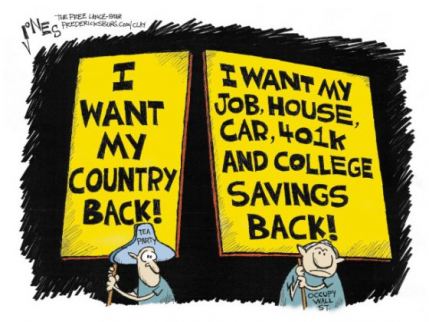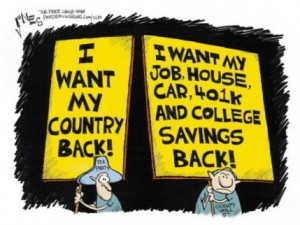
Tea & Occupy: Forget 99% and 53%, Let’s Agree on 2/3.
October 25, 2011Student Blogs Article Many American citizens are familiar with the Constitutional amendment process to the extent they see it as exclusively within the federal legislature’s power. In fact, there is an alternate path—one that has never been successfully used. Fear of use of the alternative, though, has forced Congress into action at several critical junctures in American history.
Many American citizens are familiar with the Constitutional amendment process to the extent they see it as exclusively within the federal legislature’s power. In fact, there is an alternate path—one that has never been successfully used. Fear of use of the alternative, though, has forced Congress into action at several critical junctures in American history.
No discussion of the Article V Convention’s utility at present would be complete without reference to Lawrence Lessig and Mark McKinnon’s work in the movement. A prominent liberal political activist and Harvard Law School professor, Lessig has been vigorously advocating the Article V Convention as a medium for change. Alongside him stands the conservative political strategist Mark McKinnon, and despite opposing political stances, Lessig and McKinnon launched the organization Call A Convention a few years ago with a shared purpose. The organization’s call-to-action is invoking Article V’s lesser-known path to amendments:
“Article V of the Constitution gives the states the power to call for a Constitutional Convention. To do so, two-thirds of the states—34 out of 50 state legislatures—must pass an application calling for a Convention. If enough states pass this simple resolution, then Congress must call a Convention so that states can propose amendments to the Constitution.”
George Mason, Virginia’s delegate to the United States Constitutional Convention in 1787 (the last time we had one), argued for this alternate route by pointing out that if the only way to amend was by the federal legislators’ consent, “they may abuse their power, and refuse their consent on that very account.” The point is highly relevant today given widespread rumors concerning Congress’s own employment perks. While several of these rumors are false, it is true that our Congressmen and women are entitled to a pension after one term of service; moreover, that pension doesn’t get taken away even if they become criminals! The most egregious example of this is the infamous Randy “Duke” Cunningham—who admitted to taking millions in bribes from defense contractors but is still receiving his pension. After the scandal broke, Senator John Kerry proposed an Act in Congress designed to revoke pensions for members of Congress who commit certain offenses. A noble effort, but of course, it didn’t pass.
Therein lies the problem. Congress has become the big, broken arm in this country that serves large corporations with special interests rather than the American people with broad interests. Perhaps the most convenient trick Congress has carried out on Americans is using their ‘endorsements’ to pit Tea Partiers against Occupiers of Wall Street. Why? Because a united front is the only way we can change the system once and for all—the system that favors Congress.
To learn more about Article V Conventions, check out this op-ed by Lessig and McKinnon over at The Daily Beast.
You may also like
4 comments
- November 2024
- October 2024
- April 2024
- March 2024
- February 2024
- November 2023
- October 2023
- April 2023
- March 2023
- February 2023
- January 2023
- December 2022
- November 2022
- October 2022
- May 2022
- April 2022
- March 2022
- February 2022
- January 2022
- December 2021
- November 2021
- October 2021
- May 2021
- April 2021
- March 2021
- February 2021
- January 2021
- November 2020
- October 2020
- September 2020
- August 2020
- July 2020
- June 2020
- May 2020
- April 2020
- March 2020
- February 2020
- January 2020
- November 2019
- October 2019
- September 2019
- April 2019
- February 2019
- December 2018
- November 2018
- October 2018
- September 2018
- March 2018
- February 2018
- January 2018
- December 2017
- November 2017
- October 2017
- September 2017
- May 2017
- April 2017
- March 2017
- February 2017
- December 2016
- November 2016
- October 2016
- April 2016
- March 2016
- February 2016
- January 2016
- December 2015
- November 2015
- October 2015
- June 2015
- May 2015
- April 2015
- March 2015
- February 2015
- January 2015
- December 2014
- November 2014
- October 2014
- August 2014
- March 2014
- February 2014
- January 2014
- December 2013
- November 2013
- October 2013
- September 2013
- May 2013
- April 2013
- March 2013
- February 2013
- January 2013
- December 2012
- November 2012
- October 2012
- September 2012
- June 2012
- April 2012
- March 2012
- February 2012
- January 2012
- December 2011
- November 2011
- October 2011
- September 2011
- August 2011
- April 2011
- March 2011
- November 2010
- October 2010
- September 2010
As much as I like the idea of an Article V convention, I don’t think that’s really the ultimate panacea in this case. In fact, if we’re to assume there are alternative methods of Constitutional change that don’t involve the formalities of Article V, the whole Article V convention idea — which could potentially be a Pandora’s box, given the patchwork of political interests in this country — could be considered only one approach to this whole problem.
Bruce Ackerman has been endorsing this idea of non-Article-V Constitutional change for quite some time, and I think we’re on the cusp of something like that. Ackerman argues that outside Article V, the “People” (as in “We the People”, the title to his book(s)) can effectuate massive Constitutional changes via what amount to massive social movements. Ackerman usually points to the New Deal as the shining example of this, where FDR’s strong administrative policies (tied with his control of the judiciary via his court packing plan and his vaguely favorable legislature) effectuated a massive change that created a “New Deal” constitution that is “far less respectful of the rights of property and contract [and] far more respectful of national power.” In short, Ackerman argues that America can and has fundamentally changed the Constitution without even considering Article V.
If we are to assume Ackerman is true and that such extra-Constitutional Constitutional changes can be made, then Lessig’s whole call for a Constitutional convention may be premature, or at least perhaps unnecessary. I’m of the opinion that we’re on the cusp of another Ackermanian period of Constitutional change, and I’m actually writing a (terrible) paper to that effect. Still, who knows, there may be something special about this particular problem (high government corruption, stubborn legislatures and executives, etc) that may necessitate what Lessig endorses.
The article presents two problems with Congress. First, that Congress is beholden to corporate interests. Second, that Congressmen and women abuse their power for personal profit. Both are serious problems, and in, fact they are interrelated. But I think the former problem, that our legislature is an agent of corporations, is a larger problem than the latter, that Congressmen and women take home pensions they don’t deserve. But the fix you propose for this problem assumes that state legislatures are not beholden to corporate interests, which is plainly false. Whatever constitutional changes state legislatures may concoct will not benefit the masses of ordinary Americans because those state legislatures have proven to be as corrupt as, and in the case of quite a few states even worse than, Congress.
For that reason, I agree with Kirk Sigmon that real change will only come through mass social movements.
Congress is not at fault when the STATES have not called for a constitutional convention.
I agree that members of Congress that commit certain crimes should not receive pensions, however that is beside the point. This article seems to miss the point that it is trying to assert. Unless I am mistaken, the point is that there is an alternate route to pass constitutional amendments: this being Article 5 of the constitution which states in part ” The Congress, whenever two thirds of both houses shall deem it necessary, shall propose amendments to this Constitution, or on the application of the legislatures of two thirds of the several states, shall call a convention for proposing amendments, which, in either case, shall be valid to all intents and purposes, as part of this Constitution, when ratified by the legislatures of three fourths of the several states … ”
This amendment gives power to the states to call a constitutional convention when the STATES deem it necessary. Let us look at part of the Article without the distraction of other clauses. “The Congress … on the application of the legislatures of two thirds of the several states, shall call a convention for proposing amendments…”
This portion of Article V, at least in my view, takes the power out of Congress’s hands. If two thirds of the states are willing to apply for a convention, then, at least textually, Congress is obligated to call a convention. So, whatever the issues are with Congress, if the states are willing to call a convention, then it is entirely feasible. This article seems to deny that fact by pointing to the lapses in acts that are within congressional powers. Revocation of pensions for its members is within the powers of Congress. However, I would like to believe, hopefully not naively, that the courts will enforce an application by the states if the states chose to call for a convention.
Article V of the constitution provides a way for the states to call for a constitutional convention that may not be blocked by Congress. Failure to achieve this result should not be blamed on Congress.
Randy: To clarify, the reason to ‘blame’ Congress or criticize their pensions isn’t to blame them – specifically them – for the lack of a state-sought Constitutional Convention thus far. The point here was to say, essentially, the movements agree Congress isn’t doing a great job – so regular citizens should know about this alternate option: a way to circumvent the problematic inefficiency of Congress. So of course Congress isn’t involved in this process, and the finger isn’t being pointed at them in this process. I point out the pensions to say: we all seem to acknowledge that Congress sucks as a vessel for change right now, so let’s stop trying to fix things that way – how about we try this alternate route, and rally state legislatures.
Which brings me to Kirk’s point…
Kirk: I think the point about state legislatures being just as much in the pockets of lobbyists is extremely important, and while it had occurred to me prior – I considered it beyond the scope of this post (which was just to point to the general option of using Article V, which many citizens aren’t even aware of). All this to say – it’s unfortunate that the provision in Article V isn’t more conducive to dodging elected representatives in order to obtain Constitutional change. I admit I am cynical at what social movements can do absent an arsenal of power at their beck and call within government, but history is rife with battles won this way. The major problem here is that we don’t have a unified social movement. Our movements – tea party v. OWS – are just as “us v. them” as Congress is right now.